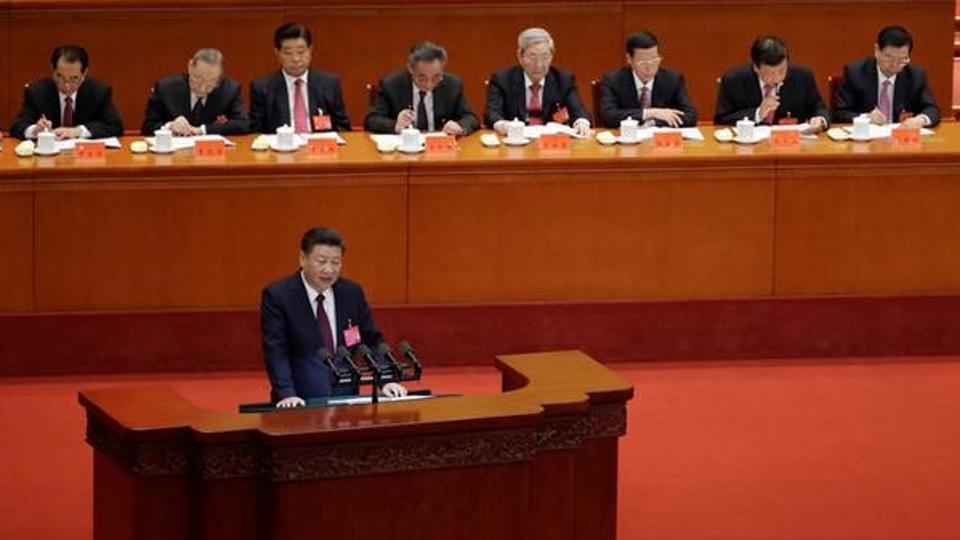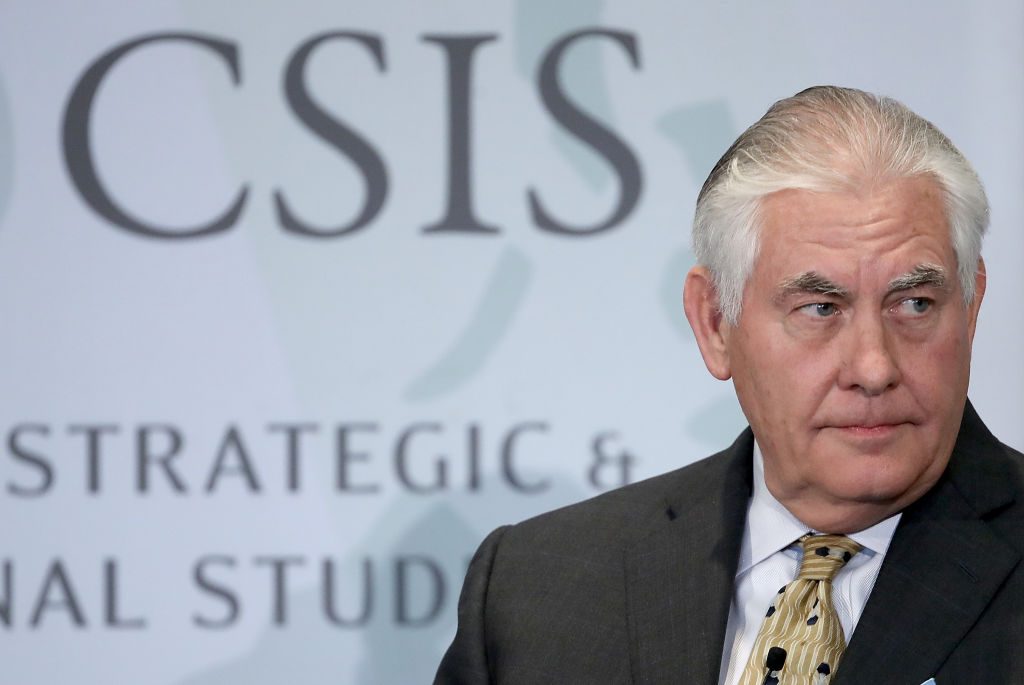
 The 19th Party Congress Begins
The 19th Party Congress BeginsOn Wednesday, President Xi Jinping opened the twice-per-decade Communist Party Congress with a 3.5 hour speech that had "something for everyone" – including an app which allowed young smartphone users to virtually "clap" during each round. International commentators have scrambled to digest the sweeping speech – which covered everything from economics to society as he laid out his vision for China. If you don't have the patience to parse the speech, Discovery Channel China has a series which also seeks to explain the last five years of Xi's vision for China.
Many have likened Xi's speech to a "report card" on China's performance since the president came to power five years ago, which Tan Hongkai describes as "the CPC's most comprehensive road map for its own, and the country's development, to date." Amalgamating the analysis by Western media outlets like The New York Times, Washington Post, The Guardian, Foreign Policy, and more, a neatly-parsed drumroll of key takeaways reads something like this: "Xi wants China to rise", "China has little interest in systems of western democracy", "Beijing talks tough on regions eyeing independence", "Xi seeks economic change rather than market reform", and "the Communist Party wants to lead China into a new era."
All of these concepts fit in with President Xi's rhetoric and ideology to date, which, according to Research Scholar Qin Xiaoying, "boil down to the omnipresence of state power." Reuters reporter John Ruwich, who attended the remarks, saw the speech through a slightly different lens. According to him, underlying all of these messages was the idea that "China is strong but getting stronger, and it is confident but getting more confident." Speaking directly to China, phraseologists have pointed to the language he used in noting "the contradiction between the people's increasing demand for a nice life and unbalanced and insufficient development," marking a pivot in his economic and development goals.
But in some cases, the omissions were more telling than the content. Xi did not mention Donald Trump, North Korea, or any other policy headlines, focusing on China and China alone. Perhaps more notable was his decision not to mention a key Party goal of doubling GDP by 2020, a move which some believe signals a shift away from quantity and towards quality.
Overall, it is important for Western readers to recognize that – even among the best news outlets – distilling translated three-hour speech into bullet-pointed themes rarely paints the full picture. However, themes identified in Xi's speech by talented journalists and commentators are likely to be strongly felt throughout the remainder of the Congress and into the next decades.
 China-U.S. Relations Coming to a Rapid Boil Ahead of Trump's Visit
China-U.S. Relations Coming to a Rapid Boil Ahead of Trump's VisitPresidents Xi and Trump had enjoyed a good start to their relationship, starting in April, at Mar-a-Lago, which resulted in the 100 day action plan for economic cooperation. However, the tides have certainly changed, as tensions have steadily escalated over the months since their initial meeting. Trump will visit Asia next month, including a 3 day visit to China. Looking ahead, the White House noted that "Trump will call for action on North Korea - which has been a key issue in the China-US Relationship." Further, it appears that Trump will focus on increasing regional pressure, where the U.S. perceives China to be the key. The White House further commented on the trip as a whole noting that "while in Asia, Trump would 'call on the international community to join together in maximizing pressure on North Korea.'" Though some, such as U.S. Commerce Secretary Wilbur Ross, remain optimistic, hoping that "there will be some very good deliverables," actions in recent months paint a more tense picture.
One topic which will surely be part of the dialogue between the two leaders will be the events which transpired just this past August, when President Trump instructed United States Trade Representative Mr. Robert Lighthizer to investigate Chinese trade and IP practices. Erin Ennis, senior vice-president of the U.S.-China Business Council, spoke at the hearing, stating that "that rules that required them to transfer technology to Chinese enterprises 'as a condition to gain market access' might place 'unreasonable and discriminatory burdens' on American commercial interests." The goal of past section 301 investigations have been to try and force a negotiations to resolve long standing trade issues. The official inquiries and hearings only began just last week, during which The Diplomat wrote that "despite China's IP practices...many of the public comments on the investigation also showed that multilateral action, negotiation, or WTO-compliant retaliation would be the preferred course of action to address their concerns."
Though many would like to see a peaceful resolution to the situation, many feel that the outlook is less than optimistic, and a negotiated settlement also unlikely, as China remains generally unwilling to change their IP laws. Chen Zhou of the China Chamber of International Commerce expressed his fears that measures by the administration to impose unilateral penalties on China "may trigger a trade war." Driving fears further, just a month ago, Trump had been working to try and court the European Union and Japan to join the charge against Chinese trade and IP practices. A senior EU official was quoted as stating: "I don't think we would be ready to support the U.S. if at the end of the investigation they decide to go unilateral." However, both the EU and Japan had indicated that they might be willing to work with the US if the issue was taken up at the World Trade Organization.
In addition to trade relations, the talks between the two leaders will likely focus on North Korea's nuclear programs, as well as a number of points which Secretary of State Tillerson had made during his speech as the Center for Strategic and International Studies (CSIS). He noted that "The United States seeks constructive relations with China, but we will not shrink from China's challenges to the rules-based order and where China subverts the sovereignty of neighboring countries and disadvantages the U.S. and our friends." Such comments would surely work to mount pressure on Beijing to tackle any number of security issues in the region, including North Korea. Following up on his speech at CSIS, Tillerson gave an interview at the State Department noting "we're expecting to see some change, we're expecting to see some movement, whether it's North Korea, or whether it's South China Sea, or whether it's trade."
China had delivered a response through Foreign ministry spokesman Lu Kang. He said China hoped the United States could "abandon bias when viewing its actions overseas...China will never develop itself at the expense of other countries...at the same time we will never give up our justly deserved rights and interests." The remarks show how the Trump administration is using defense ties with India to offset China's economic and military influence in the region, experts told The Cipher Brief. Now that the stage has been set, it will be interesting to see if Trump and Xi has ease tensions on both trade and security issues, which have grown from a steady to a rapid boil.
 China Also Has a Gender Problem
China Also Has a Gender ProblemIf you've been following the 19th party congress, you may have noticed that there are very few women among the nation's delegates on stage and in the Chinese Communist Party Politburo. Back when the People's Republic of China was founded Mao Zedong's quote, "Women hold up half the sky," was instrumental in transforming the means of production in Chinese society. This ideal still hasn't become visible in political representation.
Hong Kong just elected Carrie Lam Cheng Yuet-ngor as the first female chief executive, and Taiwan's current president, Tsai Ing-wen, is female too. Mainland China, however, has not yet had a female top leader. As Cheng Li of Brookings Institution noted in a March 30 China-US Focus commentary: "With the exception of the 10th Party Congress in 1973 and the 11th Party Congress in 1977, women have never made up more than 10 percent of the total membership of the Central Committee. Only a handful of female leaders have ever served in the Politburo." However, most of those were the wives of male leaders. More importantly, he notes that the next generation of political leadership is lacking, with only two women potentially joining Xi Jinping's next Politburo. "Although the PRC party-state system has successfully incorporated a broader range of backgrounds and viewpoints over time, China lags behind global trends in elevating female leaders."
As ripples of the Harvey Weinstein sexual assault allegations extended far beyond Hollywood, leading to a #MeToo hashtag on Twitter and more than 12 million "Me Too" posts, comments, and reactions on Facebook in a 24 hour period, in China, an op-ed article from an Egyptian-Canadian commenter led to a significant social-media driven backlash, and was eventually removed without explanation or apology. "Behaving inappropriately toward women, including harassing them sexually, contradicts every Chinese traditional value and custom," the author wrote. The Washington Post reacted: "On Twitter, men and women who have lived in China pointed out that sexual harassment is, in fact, very prevalent in China but is rarely discussed."
Jiayun Feng found several studies showing that despite the prevalence of gender-based violence, few incidents are recorded or brought to the police. Her SupChina piece included a study showing that, "Even though the incidence of rape based on police records in China stood at 2.1 per 100,000 people from 2003 to 2012, 'a large number of sexual abuses are not recorded.' A 2013 survey indicated that 22.7 percent of Chinese males said they had raped a woman.'
One factor that does have unique implications for China is how incidents can be handled with less transparency. Dr. Edward Chan of Hong Kong University argues in his research a Chinese "cultural tendency to think that female victims are probably involved in an intimate partner and therefore police should not intervene." Yes surprisingly, this censorship doesn't necessarily extend to the internet sphere as Joanna Chiu noted in Foreign Policy: "While authorities don't hesitate to delete comments relating to social injustices, they are less likely to delete online complaints about physical and sexual assault or imprison bloggers for 'spreading false rumors" about such crimes.'"
It is apparent that China is no different from the West in its systemic gender-violence problems. Whether in Hollywood or a Shanghai financial firm, victim blaming and gender biases toward men in power can be experienced—and can often go unchecked.
 This Week in Chinese History
This Week in Chinese HistoryOn October 16th, 1964, China joined the rank of nations with nuclear weapons capability, after a successful test of an atomic weapon. China became the fifth and final "nuclear weapon state," under the terms of the Treaty on the Non-Proliferation of Nuclear Weapons (NPT), joining the United States, the Russian Federation (the successor state to the Soviet Union), the United Kingdom, and France.
The test, coming just two months after the Tonkin Gulf Resolution--a congressional resolution giving President Lyndon B. Johnson the power to respond to communist aggression in Vietnam--created a frightening specter of nuclear confrontation and conflict in Southeast Asia.
The test also concerned the Soviet Union; the split between the USSR and communist China over ideological and strategic issues had widened considerably by 1964. The Chinese acquisition of nuclear capabilities only heightened the tensions between the two nations.
Indeed, the test might have been a spur to the Soviets to pursue greater efforts to stop the proliferation of nuclear weapons; in 1968, the United States and the Soviet Union signed the Treaty on the Non-Proliferation of Nuclear Weapons.
Prepared by China-US Focus editorial teams in Hong Kong and New York, this weekly newsletter offers you snap shots of latest trends and developments emerging from China every week, while adding a dose of historical perspective.
- 2017-10-13 Tech Titans
- 2017-10-06 China’s Super Golden Week
- 2017-09-29 All Quiet on North Korea’s Western Front?
- 2017-09-22 Back Together and Better than Ever: Renewed Sino-Russian Relations
- 2017-09-15 China positions itself to dominate the industries of the future
- 2017-09-08 Did North Korea just test a hydrogen bomb?
- 2017-09-01 Are Forced Technology Transfers Forcing the U.S. and China to Rethink How They Do Business?
- 2017-08-25 Bannon Out: What now for the China-US relationship?
- 2017-08-18 Trump Launches “Investigation on Whether to Investigate” China’s IP Laws
- 2017-08-11 Threats of "Fire and Fury" on the Korean Peninsula
- 2017-08-04 Trump Administration Plans Trade Actions Against China
- 2017-07-28 Xi to Dominate the 19th CPC Congress
- 2017-07-21 A Steely Comprehensive Economic Dialogue
- 2017-07-14 South China Sea Arbitral Award after One Year
- 2017-07-07 Now is the Trump Honeymoon with China Over?
- 2017-06-30 China Passes New Intelligence Law
- 2017-06-23 The End of China’s Honeymoon with Trump & Diplomatic and Security Dialogue
- 2017-06-16 Climate Change and Reliable Data Dealt Blows
- 2017-06-09 India, Pakistan formally welcomed into the Shanghai Cooperation Organization
- 2017-06-02 Once Partners in Fighting Climate Change, Trump Retreats, China Stays Steady on Paris Climate Accord
